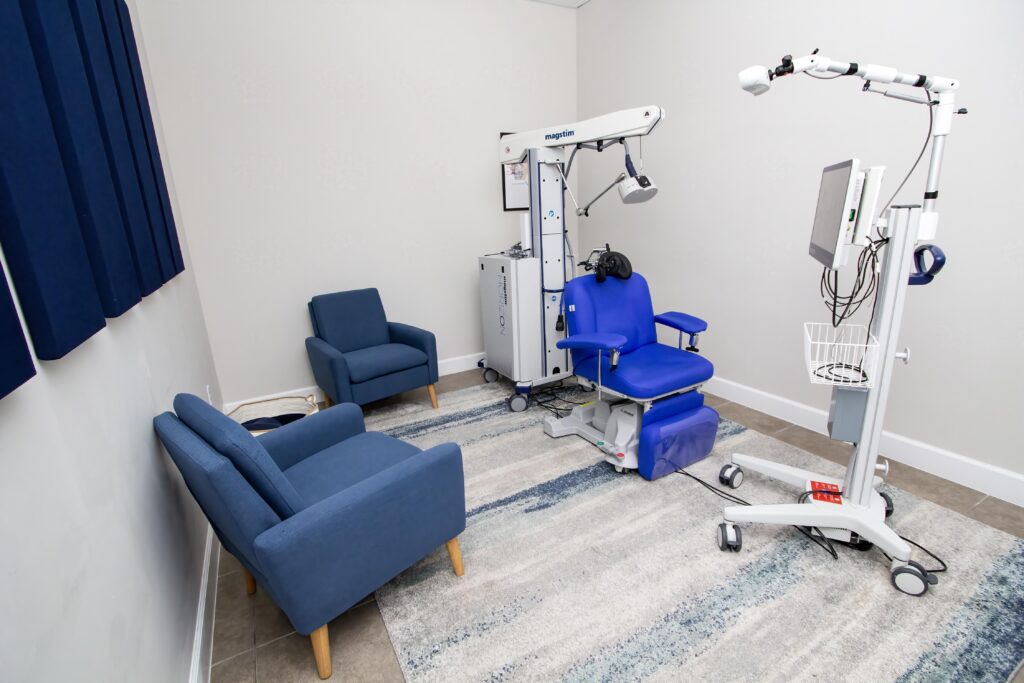You would be nothing without your brain, but have you ever thought about what your brain is?
In the abstract, it’s a fat-based organ that sends signals throughout the body. While trauma certainly plays a role in the development of addictions, anxiety, and mood disorders, we can’t discount the role of those electrical movements.
What happens when something goes wrong with those impulses in the brain?
That’s where TMS therapy comes in. This new treatment modality addresses physical issues in the brain that can cause mental health symptoms. It does all this without the need for medication or chemical interventions.
Are you curious about TMS treatment and whether it might improve your mental health? Continue reading to learn about how a non-invasive outpatient procedure is changing lives.

What Is TMS Therapy?
TMS stands for Transcranial Magnetic Stimulation. Transcranial means “through the skull.”
This treatment uses powerful magnetic pulses. They stimulate areas of the brain responsible for many common mental health symptoms.
TMS is not the same as electroshock therapy. It does not share the same controversial reputation or side effects. In contrast, it is mild, non-invasive, and generally pain-free.
What Happens During TMS Treatment?
The practitioner will place a special electromagnetic coil on your head during treatment. They will use the coil to generate a series of magnetic impulses. This should stimulate less active areas of the brain.
The treatment can last for up to one hour, and you’ll be awake the whole time. You’ll sit in a comfortable chair during the entire session. Some patients enjoy listening to music or podcasts during treatment.
You can usually finish a round of treatments in just nine weeks. However, the process does require a minimum level of commitment. Many patients undergo about five treatments per week before tapering off.
Treatment is the same whether you receive TMS for anxiety, depression, or substance addiction.
What Does TMS Therapy Feel Like?
Treatment can be noisy but is entirely painless. Your practitioner will ask you to wear ear protection during the treatment itself. Some patients describe the sensation as knocking or tapping on and around the skull.
Some individuals report some very mild discomfort related to “twitching.” This is because the magnets can trigger small movements in the body. A professional will determine your threshold during your first session.
Most patients don’t experience any notable impairments or symptoms after treatment. In rare cases, side effects include headaches, lightheadedness, spasms, or discomfort.
If you receive TMS therapy as an outpatient, you can drive yourself home. Most patients return to normal activities immediately.
How Does TMS Treatment Work?
During TMS treatment, electromagnets stimulate the areas of the brain responsible for regulating moods and impulses. In many mental health disorders, this part of the brain does not perform as expected.
The goal is to stimulate those underutilized neurons. Stimulation encourages activity, impacting how you feel and behave. In other words, it “wakes up” connections in the brain, helping it to communicate better.
Most patients report a boost in motivation and happiness following treatment. Professionals are still learning about how and why this treatment works the way it does. Recent studies suggest researchers are optimistic.
What Conditions Does TMS Therapy Treat?
TMS therapy is an effective treatment for various mood and behavioral disorders. This includes substance addiction disorders.
In some cases, it helps treat related underlying symptoms. For example, TMS is often an effective treatment for withdrawal-related mood changes.
TMS therapy for depression has particularly positive outcomes. Patients with treatment-resistant depression often find that TMS relieves symptoms that therapy and medication do not.
If other treatments have not worked for you, it may be worthwhile to give this alternative a try.
In most cases, individuals undergoing TMS therapy continue to attend talk therapy with an individual counselor.
TMS therapy may also help treat the following:
- Cravings related to addiction
- Major depressive disorder
- OCD and other anxiety disorders
- PTSD and trauma-related conditions
- Hallucinations related to bipolar disorder or schizophrenia
This treatment can be beneficial for some medical conditions, too. Practitioners use it to soothe the symptoms of MS, chronic pain, and even Alzheimer’s disease.
Be aware that TMS is not the proper mental health treatment for everyone. About 70% of individuals with depression report experiencing relief from their symptoms.
What are the TMS Therapy Benefits?
The most significant benefit of TMS therapy is relief from symptoms of mental health disorders. It helps individuals with many conditions self-regulate.
Several other benefits make this form of treatment more appealing than alternatives.
Benefits of TMS Therapy Include:
- It’s pain-free and non-invasive
- It does not involve medication
- There are very few side-effects
- You can complete the treatment in a few weeks
- Results often last for up to a year
- It’s highly effective
These benefits are particularly attractive to individuals in recovery. TMS is one of very few effective, chemical-free treatment options. It addresses many challenging aspects of addiction treatment, such as cravings and mood changes.
While TMS cannot “cure” addiction, it is an effective element in a comprehensive treatment plan. If you’re struggling, it’s worth looking into TMS therapy near me.
Comprehensive Wellness Centers: Your Source for TMS Therapy in Florida
TMS therapy is becoming a component of many mental health and addiction recovery programs. It is a painless, non-invasive solution that addresses the physical causes of many disorders. If you’re struggling, it might be time to give this treatment a try.
Your recovery journey begins at Comprehensive Wellness Centers. We offer TMS therapy as part of our comprehensive approach to treatment. Learn more about our programs, then connect with our admissions department to discover the benefits for yourself.













